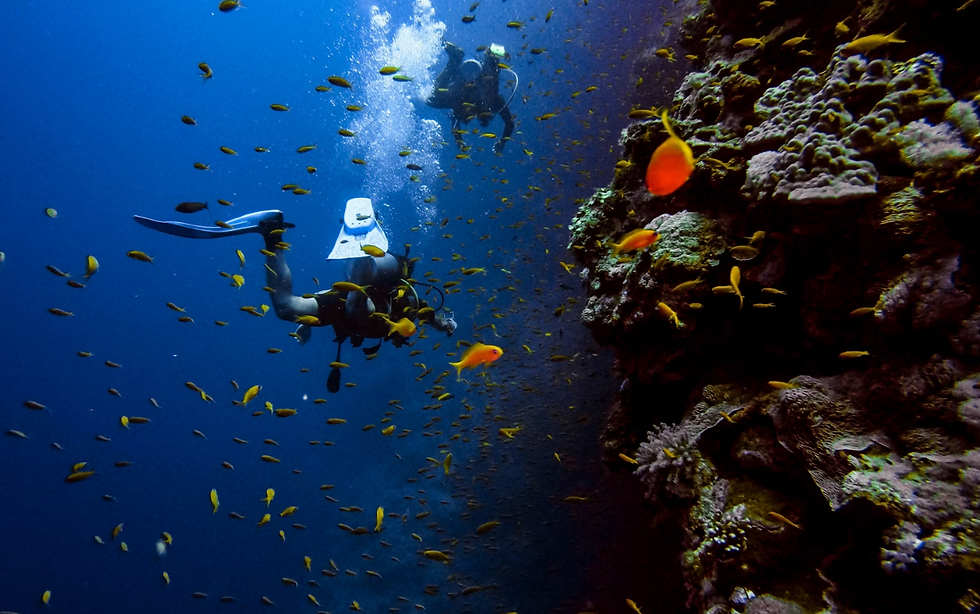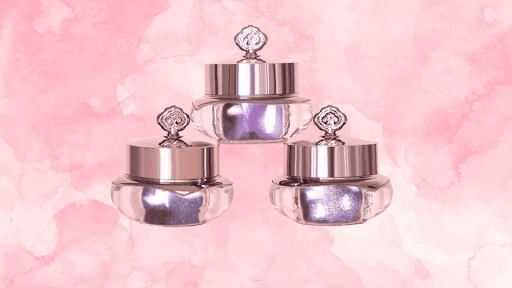How to SCUBA Sustainably
- Rylee Dudley
- Aug 21, 2025
- 5 min read
By Rylee Dudley

How would you feel if someone was bouncing off your home's walls and destroying everything they touched? Constant noise, accidental bumps, and the occasional body flop into your furniture- it wouldn’t be pleasant. For marine life, this is sometimes a harsh reality when we enter their world without proper care.
SCUBA diving offers a fascinating way to explore the underwater world, revealing gorgeous coral reefs and intricate ecosystems. But with that privilege comes great responsibility. Sustainable SCUBA diving means diving in a way that protects, respects, and preserves the ocean environment. By practicing sustainable SCUBA diving, we can minimize harm to marine ecosystems, ensuring that our ocean remains vibrant for generations to come. It’s not about diving less, it’s about diving smarter.
The ocean covers 71% of our planet and supports much of life on earth, directly and indirectly. Coral reefs are often called the “rainforests of the sea” as they are home to an incredible amount of marine life. Sadly, these environments are under threat due to pollution, climate change, and unsustainable tourism. That means every dive counts. Whether you're diving off the coast of Florida, exploring the cenotes of Mexico, or even snorkeling at your local beach, the way you interact with the ocean has a lasting impact. By making a few conscious choices, you can make sure your underwater adventures are helping the ocean and everything that calls it home.
One of the most important tools for sustainable diving is learning buoyancy to control exactly how you move in the water. You’ll often see SCUBA divers wearing a special jacket that looks like a bulky vest. This piece of gear is called a Buoyancy Control Device (BCD), and it does exactly what it sounds like: controlling buoyancy. But why is controlling buoyancy so important that divers wear a piece of gear worth thousands of dollars? BCDs are a diver’s lifeline for many reasons. When connected to the tank, BCDs can use the tank to inflate or deflate. This changes the diver’s position in the water and alters one’s buoyancy; it takes many divers hours in the water to be able to control their buoyancy correctly. This is essential to avoid crashing into coral, stirring up the sediment, and helps maintain a safe dive experience.
One of the biggest threats to marine ecosystems is the temptation to touch marine life. It’s understandable to want to get close and personal with a beautiful sea turtle or to admire the colors of a reef fish. However, just like we wouldn’t want someone poking or prodding us in our own homes, marine life doesn't appreciate being disturbed. Freediver Katie Wood recalls a time when she touched a sea turtle and said, “I hadn’t just touched a turtle–I had interrupted something.”
Most marine species rely on their environment to survive. Interacting with them, whether it's by chasing them, touching them, or even making loud noises to attract them, can cause stress and sometimes even lead to physical harm. Much of marine life uses special adaptations for protection as well. Many fish have a slimy coating on their scales to deter parasites and other infections. Removing this layer by touching them can cause harm to the fish. Remember: If you respect marine life’s space, you are more likely to see natural behaviours. You get a better experience, and they stay safe, which is a win-win!
Your SCUBA gear doesn't just keep you alive underwater; it also plays a huge role in ocean conservation. Before and after every dive, proper gear maintenance is crucial for safety and sustainability. How is gear upkeep important for the environment?
Invasive Species: Tiny organisms can hitch rides on many parts of your dive gear, and some may be invasive to the body of water you are diving in. Rinse your gear after every dive, especially when travelling to different ecosystems.
Longevity: Properly maintained gear lasts longer, resulting in less waste, and it saves your wallet!
Cleaner Dives: Faulty gear can release particles of plastic into the water. Always make sure your gear isn’t falling apart and is in prime condition.
Now that you know the benefits, brush up on your gear upkeep habits by checking out these articles:
For certified divers: Check out your dive organization's specialty courses! Diving is truly a learning journey, and sustainable diving involves more than just mastering the basics. Diving agencies (like PADI, SSI, NAUI, etc.) offer many courses focused on conservation and marine ecology. Some of these courses include:
These courses deepen your appreciation for the beautiful underwater world and equip you with the skills to protect it!
Where you dive also impacts the environment. While air travel can have a significant carbon footprint, there are ways to help offset or reduce your environmental impact.
Choose Eco-Certified Dive Centers: Look for dive shops that follow sustainable practices. More and more people are being committed to helping the environment while enjoying the fun of diving!
Travel Light: The less gear you bring, the less fuel is used by your transportation methods. Many dive centers offer gear rental in the cost of your dive plan.
Support Local: Stay at locally-owned lodges and purchase locally made souvenirs. This supports the community and makes your experience more authentic!
Just like with any skill, sustainable diving takes practice. As mentioned before, mastering the perfect buoyancy takes time and practice. The best way to get this experience is by getting the water! The more time in the water, the more you’ll grow to understand your buoyancy and experience the beauty of our oceans. New to diving? Don’t be too hard on yourself, as mistakes happen. What matters most is learning and improving while doing your best to dive with care. When possible, ask experienced divers or instructors any questions you may have. As divers, we aim to help one another while having fun!
Not SCUBA certified? Anyone who enters the ocean has an impact on its inhabitants. Think of a crowded shoreline with hundreds of people in the water; every sunscreen application, plastic wrapper, and sandcastle has the potential to impact marine ecosystems. Here’s how non-divers can be part of ocean conservation:
Use Reef Safe Sunscreen: Many sunscreens contain chemicals that harm coral reefs. Look for mineral-based options and learn more about reef-safe sunscreen from “Save The Reef”.
Pick Up Trash: Join a beach clean-up or make your own! Even small bits of plastic can harm marine life.
Give Wildlife Space: Whether snorkelling or lying on the beach, avoid chasing or touching animals. Let them live undisturbed.
Educate Others: Share what you learn about sustainable practices with friends and family, as awareness spreads change!
Diving sustainably isn’t about being perfect but instead about being mindful. Every dive is a chance to witness extraordinary life and to protect it for those who come after us. Whether you have 300 dives under your belt or it's your first ocean dive, your choices matter. So gear up, take a breath, and remember that our ocean doesn’t need heroes, but it needs allies. Let’s be the kind of divers who leave nothing but bubbles behind!
Citations
Ange , M. A. (2025, May 14). Dive Gear Maintenance Made Easy. Scubadiving.com. https://www.scubadiving.com/training/basic-skills/gear-maintenance-made-easy
DAN. (2020, September 8). Gear Maintenance: Protect Your Investment and Prevent Dive Accidents. Divers Alert Network. https://dan.org/safety-prevention/diver-safety/divers-blog/gear-maintenance-protect-your-investment-and-prevent-dive-accidents/
NATIONAL GEOGRAPHIC. (2023, October 19). Ocean | National Geographic Society. Education.nationalgeographic.org. https://education.nationalgeographic.org/resource/ocean/
Save the Reef. (2024). Reef Safe Sunscreen Guide | Save the Reef. Savethereef.org. https://savethereef.org/about-reef-save-sunscreen.html
SSI. (2025). Dive Gear Maintenance: The Essential Step-by-Step Guide. Divessi.com. https://www.divessi.com/en/blog/dive-gear-maintenance-10004.html
Wood, K. (2025). Should We Ever Interact With Sea Creatures. Alchemy.gr. https://alchemy.gr/post/1032/should-we-ever-interact-with-sea-creatures
Yoder, C. (2019, April 8). The Scoop on Slime Coats. Lilly Center for Lakes & Streams. https://lakes.grace.edu/the-scoop-on-slime-coats/



